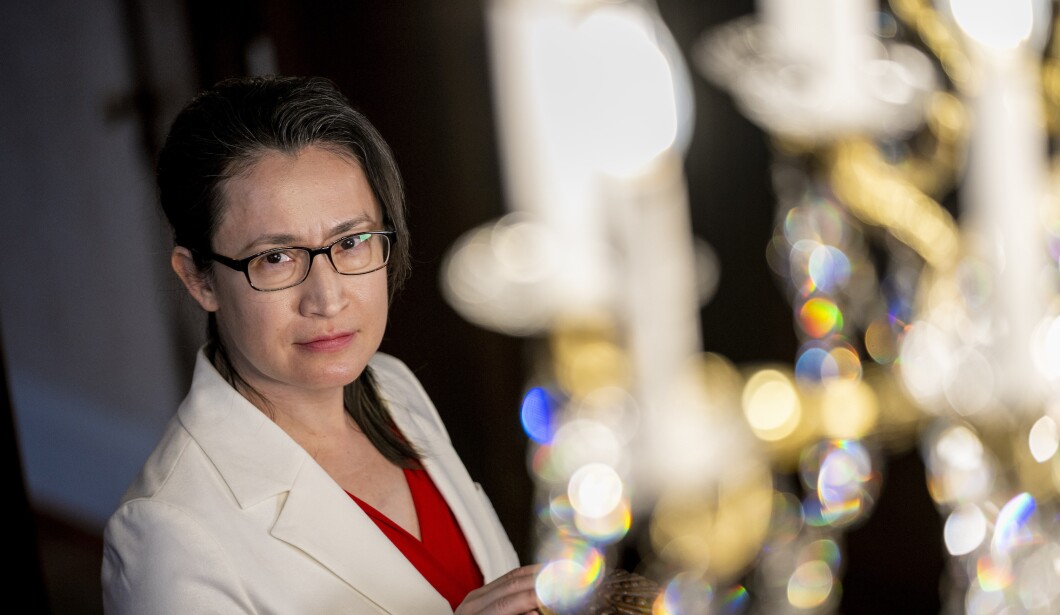
Chinese General Secretary Xi Jinping’s vaunted trip to Russia represents “a very dangerous sign” for Taiwan and other democracies, according to a top Taiwanese envoy.
“This dramatic scene choreographed between the two major authoritarian leaders of the world, Russia and China’s merging their alliance, what that says to the world, I think, is a very dangerous sign,” Taiwan’s Bi-khim Hsiao, the island democracy’s de facto ambassador to the United States, told a pro-democracy forum at the Capitol this week. “That is the tolerance, or even the desire, to use force, to inhumanely attack and deprive others of their freedom.”
Secretary of State Antony Blinken has condemned Xi for giving “diplomatic cover” to Russian aggression, but Hsiao’s statement cast China’s diplomatic alignment with Russia as a portent of the danger presented to Taiwan. And that assessment dovetailed with her contention that the defeat of Russia in Ukraine would reinforce Taiwanese security.
“The evolution of events in Ukraine, the tragedy that is taking place there, has an impact on all of us,” said Hsiao, who leads the Taipei Economic and Cultural Representative Office in the United States, as the unofficial embassy is known. “The defense of Ukraine is also the defense of Taiwan.”

That assertion has proven controversial in recent months, as the continuation of the war in Ukraine has spurred some lawmakers to argue that the U.S. cannot equip Ukraine and deter China simultaneously. Yet the conflict also has been perceived as a vindication of the affinity between Taiwan, menaced as it is by a Chinese Communist regime that claims sovereignty over the island, and some European governments and societies liberated by the collapse of the Soviet Union.
“We call Taiwan ‘Taiwan” in Lithuania,” said Zygimantas Pavilionis, who chairs the foreign affairs committee in the Lithuanian parliament. “And we hope you will follow one day when you are brave enough, like us.”
Hsiao appeared alongside a group of central European lawmakers at the annual gathering of the Kalinowski Forum, a roundtable named for a 19th-century revolutionary executed for opposing imperial Russia’s control over the late Polish-Lithuanian Commonwealth. The commonwealth once stretched across much of modern Poland, Ukraine, Belarus, and the Baltic States prior to its decline and then erasure from the map of Europe in the late 18th century.
“We are like litmus tests of the front lines,” Pavilionis told the gathering. “We feel that something bad is happening, and that’s why we are united.”
Hsiao implied that Russian President Vladimir Putin and Xi have an egotistical desire to expand their territorial control. “The very inspirational defensive battle of the Ukrainian people must be a message to the world that the use of force, the use of violence, to achieve personal legacies — there is no justification for the use of violence against another country or other people,” she said.
Taiwanese officials regard their increasing contact with legislators worldwide as a valuable alternative to official diplomatic recognition. China requires any country that has diplomatic relations with Beijing to sever relations with Taipei.
“If you look at the number of delegations coming from Europe or even from the United States, it’s just so many of them,” Taiwanese Foreign Minister Joseph Wu told the Japan Times this week. “All sorts of parliamentary delegations have visited Taiwan, and the purpose is always the same: They want to come to Taiwan, stand on Taiwanese soil, and declare that they support Taiwan in the face of the threat coming from China.”
Lithuania has been on the leading edge of China’s declining reputation in Europe in recent years. Lithuanian national security officials angered Beijing by issuing a public warning against Chinese espionage in 2019 and blocking Chinese efforts to acquire control of the Port of Klaipeda, a key port on the Baltic Sea.
In 2021, Lithuania allowed Taiwanese officials to open an unofficial embassy in Vilnius, and Chinese officials retaliated with a rash of economic punishments intended to force Lithuania to defer to China’s political priorities. U.S. and European officials countered with a series of initiatives to insulate the NATO and EU member from that pressure.
“We know that we need to continue to build our tools,” the State Department’s chief economist, Emily Blanchard, told the Center for Strategic and International Studies on Wednesday. “So we’ve deployed a tool set that works, we think, pretty well with Lithuania. But we know that the next case will be different … and so we need to build a tool set that is agile to respond to cases of coercion as they happen in the world.”
A bipartisan pair of senators have introduced legislation intended “to give the president the ability to help our foreign partners on an expedited basis,” as Sen. Chris Young (R-IN) put it this week.
“Political and security coercion are quick to follow when economic coercion succeeds,” Young told CSIS. “We empower the president with the same toolkit for Taiwan as he might apply to Lithuania or Australia or some other country. So we think the same tools apply. No unique tool set, toolkit as it relates to economic coercion is required for Taiwan.”
CLICK HERE TO READ MORE FROM THE WASHINGTON EXAMINER
Hsiao, the Taiwanese diplomat, described China’s economic crackdowns as “a more refined or sophisticated level of coercion” of a piece with the violence in Ukraine.
“As we talk about the very dramatic, the very painful scenes in Ukraine, at the same time, what is happening at a more refined or sophisticated level of coercion is on [the] economic side,” she said. “That is authoritarian regimes using tools or weaponizing economic tools to coerce other countries to accept their political terms.”





